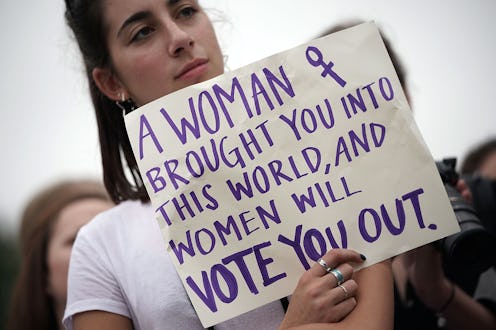News
Some Americans Apparently Still Think Women Aren’t “Emotionally Suited” For Politics

According to a Georgetown University Center on Education and the Workforce (CEW) analysis released on Tuesday, some 13% of all Americans think that men are "better suited emotionally" than women for politics. While still high enough to make the path to the White House harder for women candidates, the figure is down five percentage points from just four years earlier — before Hillary Clinton's run — and far better than the 1975 peak of about 50%.
The full report, entitled May the Best Woman Win?: Education and Bias against Women in American Politics, breaks things down further to see whether race, sex, age, or other factors influence these judgments. The CEW analysis looked at a question on the General Social Survey, carried out by the University Chicago since 1972. The exact language survey respondents were presented with was, "Tell me if you agree or disagree with this statement: Men are better suited emotionally for politics than are most women."
For the vast majority of Americans, the answer was "disagree." And that holds true across most dividing lines in American society — even if there are a few notable demographics where it remains higher than average. Most interestingly, the sex of the respondent is no longer one of them. Some 13% of both men and women think men are better suited for politics.
Political affiliation is one demographic split where this is a difference, which perhaps comes as good news for the women running for president — all currently Democrats. The report shows that "strong Democrats" share this view at a far lower rate than "strong Republicans." According to the report, strong GOP respondents, both men and women, are three times more likely than strong Democratic counterparts to say men are better suited emotionally than women.
The biggest divide, though, overall is education level. The more education attained by a survey respondent, the less likely they were to think men are better suited for politics than women. According to the report, the numbers now range from 19% of Americans without a high school diploma who think so to just 7% of those with a masters degree or higher.
"Education could play a role in further reducing intolerance," Nicole Smith, chief economist at CEW and co-author of the report, said in a press release, noting that high levels of education equate to low levels of bias. "Men and women don’t yet have a level playing field in politics, but a future in which a woman’s suitability for political leadership is not called into question may be within reach."
For now, though, there are real implications in the findings. Anthony Carnevale, director of CEW and lead author of the report, said in a press release that "in a fair contest, the American ideal is that talent ought to rise to the top" — in politics just like any other arena. "But gender stereotyping could sway voters from electing the most capable and qualified leaders," Carnevale said.
The numbers are decreasing; that's the good news. But as the report reads, women running for office "still start with a 13 percent deficit" compared to men. "The role that sexism plays in politics is shrinking," the report reads, "but it’s still too substantial to ignore."